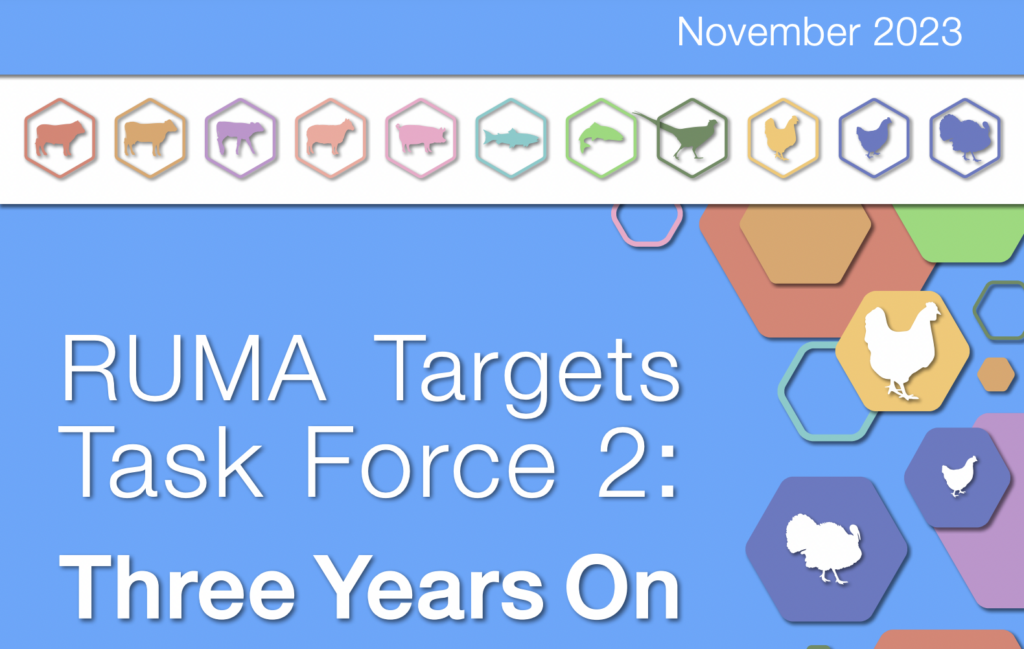The UK pig sector is continuing to make good progress towards its latest set of antibiotic targets, according to an update published today by the RUMA Targets Task Force 2 (TTF2).
However, progress could be challenged, as the final stocks of zinc oxide for medicinal use in piglet diets are depleted, it warns.
RUMA’s latest progress report summarises the third year of progress against the current set of antibiotic use targets which span 2021-2024. It was published on the same day as the Government’s VARSS report, which showed livestock antibiotic sales fell to the lowest level ever recorded on 2022.
The RUMA report highlights where targets are already being achieved or sustained, and where challenges still remain across the sectors.
It said the pig sector ‘continued to prioritise the health and welfare of the pig herd’, reducing the usage of antibiotics by 18% to 72 mg/kg PCU last year. Use of Highest Priority Critically Important Antibiotics fell again to 0.01 mg/kg PCU with no use of colistin, ‘further demonstrating the ongoing responsible approach to the health of pigs in the country’, it said.
The 2022 data shows the pig sector has achieved an overall 74% reduction in antibiotic use since 2015, taking the sector below the RUMA Targets Task Force 2 target, of a 30% reduction in total use by 2024 from the 2020 baseline.
“Meeting the target early is a reflection of the extended use of zinc oxide manufactured before the withdrawal of its Marketing Authorisation (MA) as permitted by the Veterinary Medicines Directorate (VMD),” the RUMA report noted.
“The supply of zinc oxide is close to depletion and it is anticipated that some producers will be unable to find a solution for post-weaning diarrhoea that works for their unit with the current tools available. These producers are likely to be compelled to manage the health and welfare of their pigs post-weaning through the use of antibiotics to treat clinical disease, as has been the case in some EU countries that have already lost the use of zinc oxide.”
It stressed that Ssignificant challenges continued for the sector in 2022, as, although the financial situation improved, the estimated cost to producers of the pig crisis over previous few years was £750 million, with the contraction of the UK sow herd by about 25%, leaving the smallest herd the country has had for some time.
“With a reduction in herd size comes a reduction in levy which has resulted in the need for AHDB to prioritise
their work and the subsequent loss of the Pig Health Scheme (PHS) at the end of 2022,” the report added.
“The scheme was a useful indicator for pig health and was used as a benchmarking tool by producers and their vets. The relationship between producers and their vets remains strong and underpins the responsible approach to medicine usage. During adversity and challenge the British pig sector continues to demonstrate a responsible approach to medicines and the success achieved to date is one they are rightly proud of.”
The report sets out positive progress towards other targets, including introducing a programme Introduce a programme supporting persistently high users of antibiotics to reduce their usage and reviewing and increasing medicines training update.
Positive year
The RUMA TTF summary report covers 10 sectors across aquaculture, pigs, poultry and ruminants and provides the latest annual progress update in the second cycle of TTF goals across them all.
Overall, the report welcomes ‘yet another positive year for UK agriculture in the responsible use of antibiotics’, with the RUMA targets continuing to be largely exceeded, met or on track. Where antibiotic use has been needed to address disease outbreak, ‘this has been isolated and done so in the responsible, effective and efficient manner that the UK is known and recognised for’.
RUMA Chair, Catherine McLaughlin, said: “UK agriculture is proud of its work to date on tackling AMR and, as we look ahead to the future, we will naturally start to see a shift in focus from reduction, to maintenance of the targets.
“It is important to highlight that zero use of antibiotics, be that across animal or human health, is neither viable nor responsible.
“People and animals do get sick at times even with the best health care and preventive plans in place, and antibiotics remain a key medicine in the treatment ‘toolbox’ to help people and animals recover. In those situations, antibiotics are rightfully needed and should be delivered under the mantra of ‘as little as possible, as much as necessary’.
“By only using antibiotics when truly needed, UK agriculture continues to play its role in tackling AMR and protecting the efficacy of these important medicines long into the future.”




